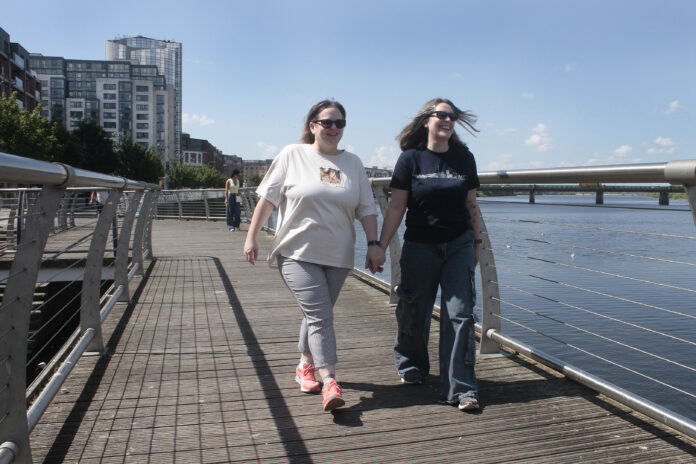
THE marriage equality referendum in 2015 is regarded by many as a social revolution and a turning point moment in Irish history. 10 years ago this week, Ireland set down a marker in becoming the first country in the world to legalise same-sex marriage. In Limerick, that support was strongly felt with the motion carried by a significant majority. With a number of events already underway on Shannonside this week to mark the milestone anniversary, Limerick Post reporter Sarah Coleman sat down with local couple Sharon Slater and Susan Mosely, who tied the knot after the historic referendum passed.
As first impressions go, award-winning local historian Sharon and software engineer Susan exude a feeling of warmth and friendliness from the moment I meet them. They are acutely in tune and beyond doubt still absolutely mad about one another.
The pair met in Florida 20 years ago, bonding over a piece of art they had both admired in a local exhibition.
Sharon and Susan are one of 158 same-sex couples that have wed in Limerick since 2016 – accounting for 2.6 per cent of all same-sex marriages nationally during this time.
Last year, 10 same-sex couples married across the county, of a national total of 668. Same-sex marriage in Limerick was at its height in 2016 when 39 couples tied the knot.
Five years after they first met, Susan, who was born in the sunny state of Florida, made the move to Ireland to be with Sharon. The move would be the first time she had ever left the US.
“The US is described as the land of the free and home of the brave, but I actually felt more free here (in Ireland) because of the acceptance and openness around people of having different lifestyles or beliefs. Whereas, in America, they say you are free but the actual reality is that it’s very ostracised,” Susan told the Limerick Post.
Door to door for love
The couple entered a civil partnership in Ireland in 2011, four years before the marriage referendum passed. Four years later, Sharon and Susan got actively involved in campaigning for the passing of the referendum in Limerick.
Leaflets were handed out and many doors knocked upon, but what was the reaction from the people of Limerick at the time?
“There were people who were quite receptive, others who just didn’t have enough information, and a third, much smaller cohort, were just downright rude,” Sharon recalled.
“Even if you had already gone to 20 doors that day and everyone was lovely, that one negative door is the one that sticks with you because they aren’t just saying it about marriage in general, they are saying it about you as a person.”
The pair wed after the referendum passed, but much to their disappointment they quickly realised that upgrading their status from a civil partnership to marriage was not going to be as easy as they first thought.
In order for a couple to get married and have the union be legally recognised, they first need to get a divorce in their civil partnership.
“We naively thought we could just ring up and say we want to upgrade our civil partnership to a full marriage, but we ended up having to do the entire thing again,” they tell me.
Finally, later than either of them would have liked, the pair got hitched and now live in Limerick City with their two sons.
Susan maintains the significance of the referendum only hit home with her after it was passed. She notes how it wasn’t something she was overly concerned with before as she “didn’t understand the scope of the difference between a civil partnership and marriage”.
‘We stopped going out a lot after witnessing that’
As the 10th anniversary of the marriage referendum is marked across the country this week, Sharon and Susan believe that while the milestone moment marked a great sign of progress for society, there will always be challenges.
“Even now there’s streets (in Limerick) that we walk around and know not to hold hands, or if, you saw a particular person, you’d know not to mention anything to them,” Sharon explains.
The pair also described numerous experiences where people shout at them in the street calling them ‘dykes’ and, rather redundantly, ‘lesbians’.
One incident that has stuck with the women involved witnessing an attack on a young gay man outside a pub in the city.
After attending a LGBTQI+ night in Limerick, Sharon was waiting outside the pub for Susan when a group of people gathered around a young gay man, shouting homophobic slurs, and “beating the crap out of him.”
“I was with him for the rest of the night in the hospital and there’s was just blood everywhere. He was only 18 at the time,” Sharon recalls.
“He was coming out of a gay space and he wasn’t alone on the street. He didn’t have gay written across his head either, he was just a young man, and it was just so incredibly traumatic. We stopped going out a lot after witnessing that,” she added.
Last October, the Criminal Justice (Hate Offences) Bill 2022 was passed by the Dáil.
While the amended version does not protect against hate speech, it will introduce harsher penalties for crimes found to be motivated by a person’s protected characteristics, such as sexuality, race, nationality, and religion.
Adam Long, board director of the National LGBT Federation (NXF), believes social media has also played a role, claiming that ” those who wish to push hateful and bigoted narratives are more emboldened unfortunately because of the online space and because of regulations on these platforms.”
As I begin to wrap up my chat with Sharon and Susan, they bring up another negative consequence since the marriage referendum passed – the amount of wedding presents they now have had to buy has drastically increased!


